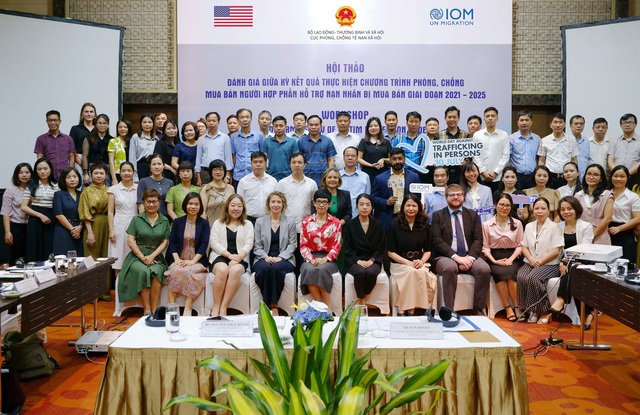IOM reaffirms support for Viet Nam to combat human trafficking
VGP - A mid-term review workshop on victim protection under the National Plan of Action (NPA) on Combating and Preventing Human Trafficking 2021-2025 took place in Ho Chi Minh City on Wednesday.

A mid-term review workshop on victim protection under the National Plan of Action (NPA) on Combating and Preventing Human Trafficking 2021-2025, Ho Chi Minh City, August 9, 2023
The event was co-organized by the International Organization for Migration (IOM) in Viet Nam and the Department of Social Vice Prevention (DSVP) under the Ministry of Labor, Invalids and Social Affairs (MOLISA).
At the workshop, the MOLISA confirmed that 40 provinces now are piloting the Inter-Ministerial Guideline on Inter-Agency Coordination, which is expected to increase the number of trafficked victims identified and assisted as per the relevant legislations and the NPA.
Speaking at the event, IOM Chief of Mission, Ms. Park Mihyung commended the Viet Nam Government's unwavering dedication to tackling human trafficking as underscored by the U.S. 2023 Trafficking-in-Persons (TIP) Report.
She also highlighted MOLISA's crucial role in their proactive engagement with other ministries and agencies at central and provincial levels for streamlined coordination and referrals for more effective victim protection.
"IOM will continue to work with MOLISA and other partners to make this happen, to explore and test the reintegration support-service models that could maximize available resources and address the complicated and comprehensive needs of persons in vulnerable situations," Ms. Park Mihyung stated.
Deputy Director General of DSVP Nguyen Thuy Duong said, the MOLISA highly recognizes the partnership and appreciates the active support of the IOM on human trafficking prevention and combat as well as victim protection and support.
DSVP and IOM have recently developed a standard screening toolkit and a reintegration model, focusing on livelihood support for victims of trafficking and migrants in vulnerable situations, she noted.
Since 2017, IOM has been supporting MOLISA and provincial partners to pilot and test various reintegration support models including a community-based reintegration model that had successfully supported 179 people through community self-help groups in Bac Giang, Hue, and Tay Ninh, as well as 550 people under combined models of individualized reintegration support and community-based models in Quang Binh, Ha Tinh and Nghe An.
Moreover, to leverage on community-based organizations for continued outreach as well as proactive referrals for victim identification and support, five One-Stop Service Offices (OSSOs) were established in partnership with Viet Nam Women's Union in five localities of Ha Noi, Hai Duong, Hai Phong, Can Tho and Hau Giang.
Nearly 200 participants representing central and provincial government agencies especially those working on victim protection, along with the representatives from embassies, academic institutions, international NGOs, and UN agencies attended the workshop series in Ha Noi and Ho Chi Minh City./.

